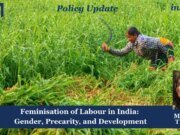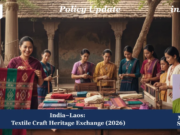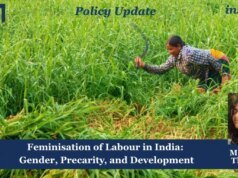Policy update
Urvashi Singhal
Background
The Ministry of Parliamentary Affairs (MoPA) is one of the most important agencies of the Government of India, which is tasked with coordinating and facilitating legislative business between Parliament’s two houses, Lok Sabha and Rajya Sabha. Founded as a department in 1949, the MoPA acts as an important interface between the Executive and the Legislature. India, being one of the largest democracies in the world, harmony between governance and representation needs to be preserved, and MoPA does just that. The ministry facilitates the seamless operations of parliamentary democracy by facilitating communication, coordination, and procedural continuity. Shri Kiren Rijiju is the 28th Minister of Parliamentary Affairs.
Functioning of the Ministry
The Ministry of Parliamentary Affairs enjoys a wide portfolio, and it works mainly towards coordinating parliamentary activity and sustaining an environment that promotes parliamentary work. Some of the main tasks are:
- Scheduling Parliamentary Sessions: MoPA schedules summoning and prorogation of Parliament sessions after taking consultation with the Prime Minister and Speaker of the Lok Sabha.
- Legislative Coordination: It makes it easy for government bills to be introduced and passed. The ministry coordinates with other ministries to make the government ready legislatively before a session.
- Government Business in Parliament: The ministry draws up the daily agenda of government business and determines the order of taking up bills and discussions in both houses.
- Consultative Committees: It provides for holding meetings of consultative committees that are affiliated to different ministries and departments so that MPs can engage with the Executive and give feedback.
- Youth Parliament Programs: With educational programs, creates awareness and appreciation of the parliamentary system among young citizens.
- Training of MPs: Orientation courses and briefings for fresh members of Parliament are conducted by the ministry to make them familiar with legislative functions and processes.
- Inter-Ministerial Coordination: The MoPA serves as a link between ministries, keeping them aligned with the legislative agenda and Parliament’s timelines.
Performance
Over the years, the Ministry has had a consistent track record in handling the delicate and often contentious character of legislative business. The main areas of performance are:
- Session Management: The ministry has been instrumental in keeping Parliament running in spite of political difficulties. For example, during the COVID-19 outbreak, it assisted in reshaping seating plans and enabled online meetings to preserve legislative work.
- Legislative Production: From parliament records, the passage of bills in sessions managed by the ministry has continued to be strong, though criticism over shorter time for deliberation in certain instances has been raised (PRS Legislative Research, 2023).
- Capacity Building: MoPA orientation training has been useful in enhancing the productivity of new MPs, particularly in comprehending rules of procedure and business.
- Youth Participation: Through initiatives such as the National Youth Parliament Scheme (NYPS), the ministry has been able to positively promote democratic participation at the grass-roots level.
Impact
The Ministry of Parliamentary Affairs has played a very important role in the legislative process and the democratic culture of India:
- Institutional Efficiency: In its role as a coordinator between the executive and legislative branches, the MoPA increases the efficiency of governance through prompt passage of bills and policy.
- Democratic Deepening: Youth participation programs and consultative committee sessions open up channels for participatory democracy, which builds a better-informed citizenry and sensitive government.
- Conflict Resolution: The ministry intervenes unobtrusively but significantly in brokering floor coordination between parties, particularly in coalition governments, to prevent legislative gridlocks.
- Strengthening Accountability: Through regular meetings between MPs and ministers via consultative committees, MoPA increases ministerial accountability and transparency.
Emerging Issues
Despite its achievements, the Ministry is confronted by several emerging challenges:
- Reduced Parliamentary Debate
There is growing anxiety with the decline in days that Parliament sits and the brief period given for debating bills. Critics have complained that this is undermining the legislative process and eroding checks and balances.
| Period | Lok Sabha avg Days/Year |
| 1952-1970s | 121-135 |
| 1977-2000s | <100 |
| 2000-2021 | ~68 |
| 17th LS (2019-2024) | ~55 |
Source: indianexpress
- Partisan Polarization
With rising political polarization, the ministry finds it difficult to achieve agreement on key legislative matters.
There are several examples where this can be seen, few of which are listed below:
- Article 370 Abrogation (2019)
- Context: The abrogation of Article 370, which gave special status to Jammu and Kashmir, was pushed through Parliament in August 2019.
- Issue of Polarization: The decision was seen by opposition parties as hasty and unilateral. The Bill was introduced and passed in both houses with minimal discussion, while several opposition MPs were either suspended or absent during the vote.
- Impact: It deepened ideological divides in Parliament, with major opposition parties labeling the move as unconstitutional.
- Farm Laws Controversy (2020–2021)
- Context: Three farm bills were passed in Parliament in September 2020 without much debate, as opposition parties walked out in protest over both content and procedure.
- Issue of Polarization: Opposition parties, especially the Congress, Trinamool Congress, and the Left, accused the government of ramming through the legislation without sufficient debate or referring them to a parliamentary committee.
- Impact: This led to large-scale protests by farmers and the eventual repeal of the laws in 2021. The manner in which these laws were passed exemplified deep mistrust and lack of consensus between ruling and opposition parties.
- Shortage of Transparency
Though the ministry organizes important segments of parliamentary business, there is scarce public information available on how business gets prioritized or how choices are made regarding legislative scheduling.
- Digital Transition
While there has been a push towards digitization (particularly post-pandemic), the ministry requires an overall digital plan to update parliamentary processes and enhance inclusive participation.
- Inadequate Use of Consultative Committees
The committees have long been criticized for being formal instead of being concrete. Reports indicate that most of the meetings are either irregular or poorly attended, thus limiting their promise as platforms for democratic accountability (Centre for Policy Research, 2022).
Way Forward
- Strengthen Deliberative Processes: Structured rules should be put in place to provide sufficient time for discussions on bills. Pre-legislative scrutiny can be advocated by the ministry, and committee examination can be promoted.
- Digital Modernization: The ministry must design an integrated e-Parliament platform for real-time tracking of legislation, online submissions, and open scheduling. This will boost both efficiency and accountability.
- Strengthen Consultative Mechanisms: Renovation of the system of consultative committees with well-defined mandates, periodical reporting, and public disclosure can rejuvenate this participatory governance tool.
- Institutional Autonomy: Despite being part of the executive, the MoPA must operate at institutional neutrality so that it will only serve the wider interest of democratic coordination and not partisan interests.
- Citizen Engagement: Further developing youth parliament programs and allowing civil society contributions to legislative agendas can transform the ministry into a center of democratic innovation, rather than merely an administrative coordinator.
- Research and Data-Driven Policy: The ministry may be enhanced by a specialized research division to analyze parliamentary trends, locate obstructionist points, and facilitate reforms based on evidence in parliamentary operations.
Conclusion
The unsung hero of India’s democratic system is the Ministry of Parliamentary Affairs. It serves as the pivot that unites the legislative process with the executive will. Even though its operations have mostly preserved institutional integrity, new issues necessitate modernization, transparency, and change. A proactive and unbiased ministry can play a crucial role in revitalizing Parliament as well as in managing it. The MoPA must change from being a strategic coordinator behind the scenes to a strategic facilitator of legislative eminence and public accountability as India enters a new era of democratic maturity.
References
Centre for Policy Research. (2022). Strengthening Legislative Institutions in India. https://cprindia.org/reports/strengthening-legislative-institutions/
Ministry of Parliamentary Affairs. (n.d.). About the Ministry. Retrieved July 13, 2025, from https://mopa.gov.in/about
PRS Legislative Research. (2023). Vital Stats: Parliament in Winter Session 2023. https://prsindia.org/parliamenttrack/vital-stats/parliament-in-winter-session-2023
Press Information Bureau. (2021). Initiatives of the Ministry of Parliamentary Affairs. Government of India. https://pib.gov.in
PRS Legislative Research. (2020). The Farmers’ Produce Trade and Commerce (Promotion and Facilitation) Bill, 2020.
https://prsindia.org/billtrack/farm-bills-2020
The Hindu. (2019, August 6). Article 370 abrogation passed by Parliament.
https://www.thehindu.com/news/national/article-370-revoked/article28829508.ece
PRS Legislative Research. (2022). Vital Stats: Parliament in Winter Session 2022. https://prsindia.org/sessiontrack/winter-session-2022/vital-stats
PRS Legislative Research. (2023). Vital Stats: Parliament in Monsoon Session 2023. https://prsindia.org/sessiontrack/monsoon-session-2023/vital-stats
The Hindu. (2024, February 4). Parliament’s average annual sitting days down to 55 in the 17th Lok Sabha from 135 in the first.
https://www.thehindu.com/news/national/parliaments-average-annual-sitting-days-down-to-55-in-the-17th-lok-sabha-from-135-in-the-first/article67835468.ece
About the contributor
Urvashi Singhal is a master’s student at DTU, simultaneously pursuing actuarial science. She is currently working as a research intern on an ICSSR project focused on menstrual leave policy.
Acknowledgment
The author sincerely thanks the IMPRI team for their valuable support.
Read more at IMPRI:
eTaal – Electronic Transaction Aggregation and Analysis Layer – 2013
Metro Rail Policy 2017: Driving India’s Future with Efficient Urban Mobility



















